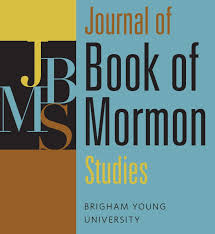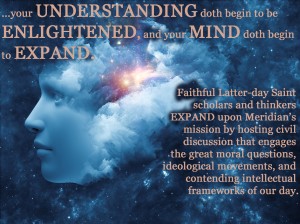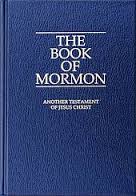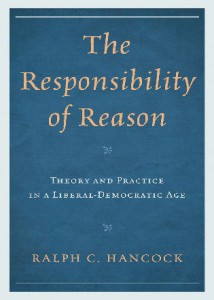I suppose I should be happy that no one has undertaken in any substantial way to dispute my reading of Benjamin Park’s review of worthy books by David Holland and Eran Shalev in the recent Journal of Book of Mormon Studies, or my analysis of the significance of this review in relation to interventions by David Holland and by Terryl Givens, and to an attempt at self-clarification by Mr. Park himself. I should be satisfied, no doubt, that the essence of my argument has not only withstood criticism, but in fact that it seems to have been judged to invulnerable by any who might have been inclined to gainsay it. So color me satisfied… up to a point. What is disappointing (though I have no right to be surprised by it), is how the arguments concerning “apologetics” as allegedly opposed to “Mormon Studies” (and vice versa) go on just as before, sometimes after the slightest nods in the direction of my article (for or against it). Facebook discussions that begin with some reference to my article soon devolve into arguments completely oblivious of the quite original considerations I have put on the table.
Perhaps the point of my gentle not-quite-critics is to concede that I have made some reasonable or at least inoffensive remarks, but then to move back to the old discussion while politely declining to explain why my remarks don’t matter in the way I think they do. Well, I appreciate the politeness, but I care more about clarifying what is at stake in the argument. And so I am led to restate the upshot of my article and to invite (or, if you will, challenge) my readers actually to address what I have said or to go ahead and hurt my feelings and, in the interest of understanding, to explain why what I have said doesn’t matter.
First, to make clear what I did not say. I did not say there was never anything deficient about something called “the old apologetics.” I didn’t discuss the old school one way or another (but I will address it briefly below). I have been criticized for not being even-handed in my criticisms. Well, my purpose was to criticize a powerful tendency in those who explicitly proclaim the virtues of the New Mormon Studies as opposed to the alleged narrowness and parochialism of the Old Apologetics. I believe I have shown, through a careful and respectful analysis of texts published by the New Maxwell Institute, that this powerful tendency is ascendant, or at least bids fair to be ascendant, in this new institute. (To respect a text is to take its claims seriously, I submit, and to assess them in the context assumed by the text itself.) I do not say that everyone at the Maxwell Institute see things exactly the same way as Benjamin Park or, for that matter as Brian Birch or Stephen Taysom or Paul Owen or Joanna Brooks, all of whom are discussed in my article. In fact I mention a number of diverging arguments published by the Maxwell Institute. But I also show that the programmatic editorial statements of the New Institute are emphatic in asserting a new beginning while being studiously neutral on the question between a believing LDS (or for that matter religious) standpoint and a purely “secular” or “scholarly” perspective. The Mormon Studies Review proclaims its desire to make friends, but leaves it to the friends to set the terms of discussion. I have reported the terms the friends have set, or, maybe I should say, that they are setting: “conservative” views that take seriously the claims of the Book of Mormon, for example, are tolerated, but progress in true “breadth” consists in dismissing any Truth-claims in order to focus on the process of historical construction. There is every reason to believe, I argue, that this is the settled editorial position of the New Maxwell Institute: we are friends with real, i.e., historicizing, Truth-bracketing scholarship – this is what is broad and exciting, as Ben Park makes so clear; meanwhile, we are generous enough to tolerate more “conservative” tendencies in some articles, as long as these are not too bold or explicit.
That would be my reading of the editorial direction of the New Maxwell Institute. (And this was before I studied up on the latest issue of the MSR, with its generous opening to queer studies and the embrace of homosexual marriage, etc.) If I am right, or essentially right, or somewhere close to right – well, this would seem to be important. Readers are invited, again, to show me, either that I am not right about this new direction, evidence of which I have gathered from a close reading of MI publications, or, alternatively, to explain how I can be right and yet this fact not be important, indeed, a matter of pressing concern to faithful LDS scholars and intellectuals.
Now, I did not in my article try to address every issue surrounding the MI, much less to describe comprehensively some better course that it should follow. I thought that to call attention to a bad course would be a sufficient contribution for one essay. But some insist on taking me to be saying that there were no deficiencies in any of the Old Apologetics. Well, that is a separate question. I hope it will not unduly shock the reader for me to confess that I have not read all the scholarship published under the MI’s Old Regime. I have read enough to know there was work of value going on there, as there certainly is in the journal Interpreter to which much of old scholarship has migrated.
Joseph Spencer in particular advises me (in a Facebook discussion that many readers of this post will have seen) to balance my argument by critiquing the “historicism” of the old school. Well, let the critique begin, I say. It’s possible that the old MI sometimes leaned too exclusively towards historical evidence (Nahum studies, just to pick an efficient example), and was not as open as it might have been to faithful theological explorations of the kind Joseph favors. If so, this would be a valid critique – though I would caution against concluding too much from the rejection of one’s own or one’s friends’ manuscripts. In any case, Joseph’s analogy between the interest in historical evidence for an ancient text and the historical reduction of modern secular scholarship seems a little strained. Still, Joseph and I agree that it is important to plumb the meaning of a text, and not only to seek out evidence of its antiquity. So yes, for the record, though I am not competent to judge, I am open to the possibility that the Old Regime should have been more open to “theology” than it was. At the same time, I believe it was a great service to provide the Saints with the evidence of Nahum (just for example), and I note that it seems to have been the wise policy of the Old MI never to claim “proof.”
Moreover, if one really wants a holistic discussion of the proper mission of the MI, then it would seem appropriate to consult the founding documents and the historical precedents embedded in the Old MI, and the encouraging statements of Elder Maxwell as notable among these. I dare say it would be easy to produce quotations from Elder Maxwell that would be dismissed as horribly narrow, parochial, indeed polemical by the New MI. In fact, one could pin all of the pages of all Elder Maxwell’s books to a large wall at the MI, if there were a wall large enough, and then have a blindfolded New MI scholar throw a dart at that wall – and I dare say the chances are very high that this dart would land on a statement the scholar would find offensive or contemptible – or at least little apt to promote the kind of “friendship” with secular historicism and the associated sexual revolution the blind-folded scholar is seeking.
To be clear: I don’t see why Elder Maxwell, or founders of the MI such as Jack Welch or Noel Reynolds, would look ill on faithful theological speculations raising questions fit to stretch and thus to improve our understanding of our religious beliefs. I certainly would not. (Hugh Nibley, I grant you, might be another question.)
My title “To Whom Shall We Go” in no way suggests that we should seek salvation in the Old Apologists. In choosing that title I meant to situate my whole argument under a spiritual claim – Jesus Christ’s invitation to come unto Him – infinitely larger and deeper than any option I explicitly discussed. My immediate point was to show how small the “excitement” surrounding the embrace of secular historicizing “breadth” appears in the light of this Invitation. Now some have responded that uncovering the place name “Nahum” is very small in comparison to responding to this Invitation. To be sure. But here’s the difference: no one who researches the place name Nahum imagines that what he or she is doing is more important than a transcendent Truth; such scholars are clearly in the service of a higher Truth, even when they are not explicitly referring to it. But the secular historicizers boldly claim that historical context is more broad and exciting than the narrow and parochial concerns of mere religious believers in Truth. Historical Context in this sense attempts to displace or at least to relegate Truth in a way that ancient evidence never does. Again, whether the search for “evidence” might sometimes risk overshadowing (1) devotional recalling of the Invitation or (2) theological exploration of the Invitation’s meaning is a question I am happy to leave open.
To sum up: Joseph Spencer, I think, has as little taste as I do for the reductionism of contextual historicizing. But he just thinks, I must suppose, that I have exaggerated the tendency of the New MI in that direction, and he is encouraged by a larger slice of the MI pie now going to theological explorations. What can I say? I hope he’s right. But I’ve lined up a lot of textual evidence that the momentum of the New MI is all in a direction that will swamp his explorations (or marginalize them) as much as it will the ancient-evidence style of research.
I’m just trying to show what alliances make themost sense among the different approaches to studying Mormon things. (Some will immediately blame me for introducing an us/them mentality into the discussion of the Mormon Studies. But I didn’t introduce it. It’s there in the rhetoric of the New MI, and in any case, any collective human enterprise requires some shared understanding of purpose, and any such understanding will “exclude” or “marginalize” incompatible understandings.) Do I need to be more plain? Joe Spencer and Daniel Peterson and I should be friends. Happily, we are; what I am saying is that we should understand ourselves as involved in complementary aspects of a common pursuit. And anyone else who shares our understanding, which fully recognizes the legitimacy of both Theology and Ancient Evidence, ought to be welcomed in our partnership. Joe might find Theology more interesting and fruitful, and Dan might lean towards Ancient Evidence. And by the way, close textual analyses, such as Joe’s own and Grant Hardy’s, for example, in a way seem to bridge the Theology/Evidence distinction – even though Joe is, happily, so serenely convinced of the Book of Mormon’s antiquity that he is just bored by the question, and Grant maintains with a magnificently resolute irony that his brilliant exploration of internal authorship evidence has no bearing on the question of antiquity. (The only objection I have to both Joe’s and Grant’s “bracketing” of the antiquity question is that, while this may increase the reach of their work in the non-LDS academy – and this seems to be more Grant’s concern than Joe’s – it might greatly diminish their influence on young minds that have not yet achieved such serenity, or such irony.)
The bad news is that, although one can and indeed ought to love everyone, forgive everyone, be kind to everyone, one cannot be friends with everyone in the sense of sharing and encouraging their projects. If I am right, then it is wrong to encourage Benjamin Park and the Editors of MSR and JBMS in their projects favoring historical contextualization as the “broadest” intellectual exercise and the best means to “widen” the audience of Mormon Studies. Benjamin and these Editors and others I have criticized have written things in public that have the potential to influence many people, and not all of them “scholars.” Their extending friendship to historical contextualization understood as intellectual superior in fact excludes friendship with “ordinary” believers in what the Book of Mormon says about itself. The Old MI at least had the virtue of sustaining such friendship between faithful LDS scholars and the proverbial HPGL (or was it Relief Society President) in Parowan. (I have actually gone to Church in Parowan, by the way, and seemed to find great faith and considerable discernment among the members there.) To modify the “tent” of Mormon Studies by Mormons in order to include secular historicizers does not actually enlarge the tent; in an eternal perspective it narrows the tent drastically; more obviously, it simply moves the tent over to include a few more academic friends and leaves thousands of interested Saints exposed to very heavy ideological weather.
Am I saying we should not be friends with Benjamin Park or Paul Owen or the Editors or others I have criticized? By no means. But an essential office of friendship is to give good counsel, and to correct our friends if necessary. I do no recall making Ben’s acquaintance personally, though I would certainly welcome the opportunity. Recently someone has pointed out that Ben has criticized me rather pointedly in the past, but I don’t care. I wish him well. He has expressed himself publicly and made important claims. I have paid him the respect of taking his language seriously and disputing certain of his claims, in particular his apparent confidence in the exciting “breadth” of contextualizing history. He is welcome publicly to critique my arguments. Friends of Benjamin or of others at the New MI who express the same enthusiasm for secular “breadth” ought to correct their friends if they think they are wrong. No doubt some such correcting has been happening in private, which is good. But what Benjamin says in public concerns more than the state of his understanding or of his soul. To express friendship with Ben publicly without countering his argument is clearly to give the impression that one essentially approves of or at least sees no harm in Ben’s view of his own activities or of those of the New MI. (And again I am just using Brother Park as one example of friends writing in public for some New Mormon Studies and against – to one degree or another – the Old Apologetics.) Such uncritical friendship is a disservice to the friends in question and is likely to result in collateral damage to innocent bystanders – impressionable readers of MSR and JBMS, most notably.
Aristotle said, of his teacher Plato, that he loved his friend, but that he loved the truth more. Now, for us Christians, there is a more intimate connection between friendship and Truth even than for the pagan philosophers. But still truth makes a difference to friendship. Truth is essential to friendship. To be sure, all our intellectual endeavors must be undertaken with a view to Christ’s Invitation; Truth must not be divorced from Love. At the same time, Love must not forget Truth. Our loyalties to particular friends, which always have a certain “tribal” aspect rooted in our fondness for common projects, our mutual interests (including the material ones), and our pride in accomplishments with which we identify, must not lead us to forget our loyalty to Zion. And this deeper loyalty now demands of us a certain clarity of thought and expression. Neither enmity nor affection must undermine intellect in the friendship of Apologetics and Mormon Studies.
Finally, a very distinguished scholar of Mormon Things has asked me privately whether I do wish that my own work or that of other LDS intellectuals might reach a wide audience, including non-believers. He says that the Apologetic school (as represented by John Sorensen, to take a notable example) has tried for 40 years to convince secular scholars of Mormon truth claims, and has gotten nowhere. Even the great Hugh Nibley failed to reach beyond a Mormon audience. So this most distinguished scholar thinks I am asking too much: he thinks I am asking that we end all conversations with those who do not accept our unique revelation.
Talk about imposing false choices! If it could be shown that we had to choose between talking only to those who believe in the Restoration and talking to those who insist on bracketing all interest in a Truth above human construction, then, well, I have to tell you I –unlike my distinguished friend, apparently — would take my stand with the Restoration. For, apart from professional rewards and the tribal loyalties that accompany them, I don’t see the game of historical context as having much intrinsic interest, once divorced, that is, from all openness to a higher Truth. However this eminent scholar chooses to read me, the line I drew was NOT between blind faith in revelation on the one hand and “secular” scholarship on the other. No, the alliance I am promoting (beyond the alliance between Apologetics and faithful Mormon studies, whether theological or historical), is the alliance among those, LDS or not, theistic or not, who are interested in at least the possibility of some truth relevant to the human soul, or to the permanent human good. What I am not interest in is bracketing the question of such Truth in order to play the endless game of contextual social construction of “truth,” however professionally advantageous and even morally convenient that game may be.
Let me conclude by referencing an important episode in Mormon Studies that, I think, well illustrates the costs and benefits of narrowing one’s questions in order to address an audience of secular historians. This episode concerns the reception of Richard Bushman’s magisterial Rough Stone Rolling, which combines uncompromising historical candor with an undisguised admiration for the complicated man he and I revere as a prophet. But to Bushman’s very great credit, he learned the hard way of “an epistemological gap [that] yawns between my view of the Prophet [Joseph Smith] and that of most academics. Believing Mormons stand on the other side of a gulf separating us from most educated people.” (On the Road with Joseph Smith). The essential question I am raising is, is it an “expansion” to cross this epistemological gulf in order to be part of the conversation with a certain kind of historian? In fact I know from my academic experience, unlike Bushman apparently, that there are plenty of “educated people” ready to cross the gulf in our direction, or rather to flout the construction of such a gulf and thus to question basic secular assumptions in order to be open to more universal human questions.
It’s just that, if Bushman is right, it’s hard to find such really broad minds among the guild of professional historians. And it is he who has said so, not me. If Benjamin Park finds it more necessary or convenient than I do to accept the assumptions of this guild, that is his choice – and, it seems, the current inclination of the Maxwell Institute. Just don’t call it “breadth.”












